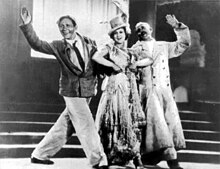Lyubov Orlova
Lyubov Orlova | |
|---|---|
Любо́вь Орло́ва | |
 Postage Stamp, Russia, 2001 | |
| Born | Lyubov Petrovna Orlova 29 January 1902 |
| Died | 26 January 1975 (aged 72) Moscow, USSR |
| Resting place | Novodevichy Cemetery, Moscow 55°43′29″N 37°33′15″E / 55.72472°N 37.55417°E |
| Nationality | Russian |
| Occupation(s) | Actor, pianist, singer, dancer |
| Years active | 1933–1974 |
| Spouse(s) | Andrei Berzin (1926–1930; divorced) Grigori Aleksandrov (1933–1975; her death) |

Lyubov Petrovna Orlova (Russian: Любо́вь Петро́вна Орло́ва; 29 January [O.S. 16 January] 1902, Zvenigorod – 26 January 1975, Moscow) was the first recognized star of Soviet cinema, a famous theatre actress, and a gifted singer.
Life and career
She was born to a family of Russian nobles in Zvenigorod, near Moscow, and grew up in Yaroslavl. Her first and last names are meaningful words in Russian: любовь means "love", and Орлова is the feminine form of орлов "eagle".
When she was seven, Fyodor Shalyapin predicted her future as a famous actress. She studied at the Moscow Conservatory but did not graduate because she had to work to support her parents. Her first husband, a Soviet economist, Andrei Berzin, was arrested in 1930. However, this did not affect her career.
In 1933 she met the novice director Grigory Alexandrov, who was casting actors for his movie Jolly Fellows (1934), and married him. Orlova's performance in this comedy, very popular in the USSR, earned the young star the sympathy of Stalin and the title "Honorable actor of the RSFSR".
In the next few years she starred in four popular movies which also became instant Soviet classics: Circus (1936), Volga-Volga (1938), Tanya (1940), and Springtime (1947). She was awarded the Stalin Prize in 1941. In 1950, she became the first woman to receive the title of the People's Artist of the USSR exclusively for her cinematic works. After that, she switched to playing in theatre productions of Yuri Zavadsky's company.
Legacy
A minor planet, 3108 Lyubov, discovered by Soviet astronomer Lyudmila Zhuravlyova in 1972, is named after her.[1] A cruise ship named after her was built by the Soviet Union in Yugoslavia in 1976 for expeditions to Antarctica and the Arctic Circle.[2][3]
In 2019, she was featured as a Google Doodle on what would have been her 117th birthday.[4]
Selected filmography
- 1934 — A Petersburg Night
- 1934 — Jolly Fellows
- 1936 — Circus
- 1938 — Volga-Volga
- 1940 — Tanya
- 1943 — A Family
- 1947 — Springtime (Special award for female role, Venice Film Festival)
- 1950 — Meeting on the Elbe
- 1950 — Mussorgsky
- 1952 — Man of Music
- 1960 — Russian Souvenir
References
- ^ "3108 Lyubov 1972 – Google Search". Retrieved 4 May 2018 – via Google Books.
- ^ Hubbard, Amy, "Ghost ship Lyubov Orlova and starving rats headed for land?", Los Angeles Times, 23 January 2014. Retrieved 8 February 2014.
- ^ Layne, Ken, "Abandoned Cruise Ship Full of Starving Rats Headed For Land" Archived 8 February 2014 at the Wayback Machine, Gawker, 1/23/14. Retrieved via facebook 8 February 2014.
- ^ "Lyubov Orlova's 117th Birthday". Doodles Archive, Google. 11 February 2019.
External links
- Lyubov Orlova at IMDb
- (in Russian) Photogallery, biography
- (in Russian) Site-Museum of Lyubov Orlova
- (in Russian) Records of Lyubov Orlova on website The Encyclopedia of Russian recordings Russian-Records.com
- (in Russian) "Ее советское сиятельство", ("Her Soviet Serenity") an article in Kommersant-Money
